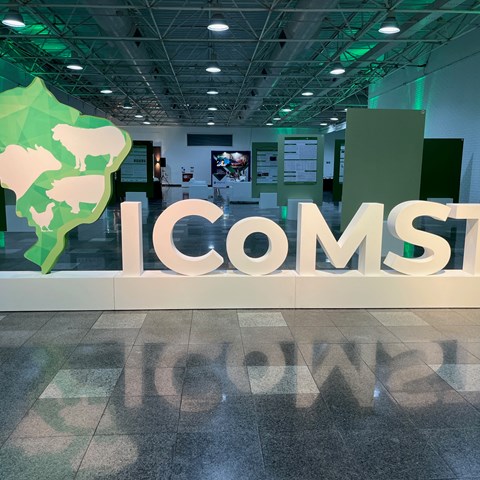Less meat or sustainable meat? The spirit of meat continues to inspire excellent research worldwide.

The 70th International Congress of Meat Science and Technology (ICoMST), the largest meat congress in the world, was held in Foz do Iguaҫu, Brazil, from August 18th to 24th, 2024. The theme for the congress was “Responsible Meat Production,” with a focus in various aspects of the meat chain from farm to fork. The congress offered a comprehensive exploration of production methodologies, animal welfare, meat quality, safety, and consumer’s attitudes in the light of sustainability and innovations. This event could not go unnoticed by SLU, which is one of the main players in Sweden in the implementation of Global Agenda 2030, including but not limited to sustainable production and consumption.
At ICoMST 2024, SLU and Sweden were represented by Professor Anders Karlsson, Associate Professor Katarina Arvidsson Segerkvist and postdoc Elin Stenberg from the Department of Applied Animal Science and Welfare, and by Associate Professor Galia Zamaratskaia from the Department of Molecular Sciences. Four posters from SLU were presented showing our research on responsible meat production and consumption. In his poster, Anders Karlsson discussed innovative ways to produce beef from dairy breeds of high and uniform quality, which would satisfy both producers and consumers. Katarina presented her results on the effect of lairage overnight at the abattoir on stress levels in steers and meat quality. Elin showed in her study how rearing intensity and genetic factors affect technological beef quality. Galia described a new product (paste) from goat meat with the addition of vegetable raw materials purslane with aim to enhance antioxidant properties. Some of our studies were collaborative projects with foreign partners – Aaruhus University, Denmark (Anders Karlsson) and S. Seifullin Kazakh Agrotechnical Research University, Kazakhstan (Galia Zamaratskaia).
At the congress, both theoretical and practical aspects behind meat production and meat quality were discussed. Internationally well-recognized meat experts, including Andrzej Sosnicki from USA, Graham E. Gardner from Australia, Stefaan De Smet from Belgium, Maria Font i Furnols from Spain, Declan Troy from Ireland and many more, participated as key-note speakers and gave a special taste to the congress and following-up discussions. We also discussed responsible meat production from industrial perspective. This session was led by Fernando Sampaio from Brazilian Association of Meat Exporters. It was obvious that there a need of tighter bridging science and industry for future innovations. The role of consumers is also indispensable, which makes meat science communications crucial for future sustainable consumption.
Meat is a rich source of proteins and other nutrients in human diet. It also has unique sensory attributes and invokes a sense of satiety. “It is important that we spread our knowledge about advantages and disadvantages of meat production and consumption to general public. Nowadays, the image of meat among consumers is unfortunately biased. However, sustainable meat production is an essential part of planet health”, said Anders Karlsson. Frédéric Leroy from Vrije Universiteit underlined that “minimising livestock beyond a critical threshold might come with unintended harmful effects on nutrient security, ecosystems, and livelihoods”. Stefaan De Smet from Ghent University explained the complexity of the advantages and risks of meat consumption. “Extrapolation from observational studies should be done with caution when evaluating the health effect of meat across general populations with different food culture due to food matrix effects”, highlighted Stefaan.
The congress provided and excellent platform for professional development as well as offered opportunities for both networking and cultural exchange. All SLU participants enjoyed the congress, updating their knowledge with innovative research in meat science, meeting old friends and colleagues and creating new contacts.
“ICoMST is an essential transdisciplinary platform for meat science experts to discuss innovations, challenges and recent breakthroughs in responsible meat production”, underlines Katarina. “It is especially important for young scientists to meet brilliant minds in meat science, and create new contacts for future collaboration”, adds Elin. “Meetings with international colleagues at such congresses can blossom into fruitful partnerships that continues for many years”, ensures Galia.
During the conference, technical tours to Federal Technological University of Parana, meat processing plant and pork processing company Frimesa were organised. The participants also had the opportunity to visit the breathtaking Iguaҫu Falls.
The delegation from SLU would like to express our sincere gratitude to the ICoMST organizing committee and the chairperson Saulo da Luz e Silva for the thoughtful arrangements and creating such a wonderful atmosphere during the congress. We are looking forward the next congress occasion, which will be held in Spain.
Link to the congress website: https://www.icomst2024.com/





